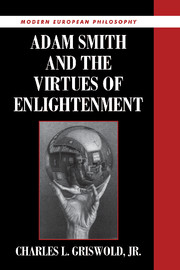Book contents
- Frontmatter
- Contents
- Texts and Acknowledgments
- Introduction
- 1 Rhetoric, Method, and System in The Theory of Moral Sentiments
- 2 Sympathy and Selfishness, Imagination and Self
- 3 The Passions, Pleasure, and the Impartial Spectator
- 4 Philosophy and Skepticism
- 5 The Theory of Virtue
- 6 Justice
- 7 The Moral Sentiments and The Wealth of Nations
- 8 Philosophy, Imagination, and the Fragility of Beauty: On Reconciliation with Nature
- Epilogue
- Bibliography
- Index
4 - Philosophy and Skepticism
Published online by Cambridge University Press: 10 November 2009
- Frontmatter
- Contents
- Texts and Acknowledgments
- Introduction
- 1 Rhetoric, Method, and System in The Theory of Moral Sentiments
- 2 Sympathy and Selfishness, Imagination and Self
- 3 The Passions, Pleasure, and the Impartial Spectator
- 4 Philosophy and Skepticism
- 5 The Theory of Virtue
- 6 Justice
- 7 The Moral Sentiments and The Wealth of Nations
- 8 Philosophy, Imagination, and the Fragility of Beauty: On Reconciliation with Nature
- Epilogue
- Bibliography
- Index
Summary
In that case, Diotima, who are the people who love wisdom, if they are neither wise nor ignorant?
SocratesSmith's account of the passions does not mention the love of wisdom. The “intellectual sentiments” of wonder, surprise, and admiration are the basis for our praising the “intellectual virtues” (I.i.4.3). But these emotions are spectatorial and not especially strong. They do not seem to have a place in any of the three categories of passion we examined in Chapter 3. By characterizing the intellectual sentiments as “spectatorial” I mean to underline the relative detachment they entail; whether the spectator is the philosopher-scientist observing the great “theatre of nature” (“History of Astronomy,” III. 1, EPS, p. 48) or the person admiring the philosopher-scientist's acumen, “theoretical” knowing seems propelled not by a desire to live out our lives with greater perfection but by a desire to restore a certain tranquillity to the nonsympathetic imagination. Consequently Smith's theory of the passions provides no explicit place for philosophy, in the etymological and edifying Platonic sense of the term.
To be sure, in its natural proclivity to enter into and understand the situation of another, to take interest in and weave together the other's story, the sympathetic imagination resembles the urge to comprehensiveness and unity tied to eros in Plato's Symposium and Phaedrus. But of course for Plato, eros also binds together mortal and divine, providing a “ladder” ascending from the ordinary (such as another's physical beauty) to the extraordinary (such as of the Forms).
Information
- Type
- Chapter
- Information
- Adam Smith and the Virtues of Enlightenment , pp. 147 - 178Publisher: Cambridge University PressPrint publication year: 1998
